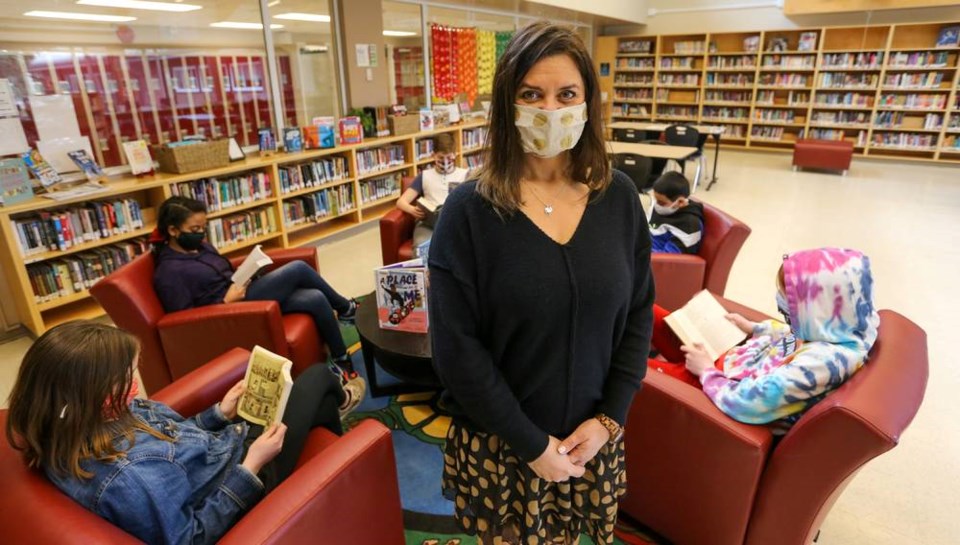No teacher would have recommended the first book I ever loved.
It was a story about an orphaned Russian boy adopted by an American platoon in the Second World War. It was cartoonish, violent, jingoistic. We kids gobbled it down like a burger with fries.
“You have to read this,” we told one another, and queued up to take it out of the school library. Where other books stayed on the shelves, as immaculate and unmoving as soldiers on parade, this one was in constant use, growing more dog-eared by the day.
By the end of the year it looked like Willie Nelson on Sunday morning.
Which is what came to mind after hearing what Michelle Hutchinson did with a big chunk of her Times Colonist Literacy Fund cheque last year. She and colleague Loa Peter piled a bunch of students into a couple of cars, took them Bolen Books and let them loose: “Go pick what you want to read.”
As teacher-librarian at Esquimalt’s Rockheights Middle School, it brought Hutchinson joy to see her charges enthusiastically plucking titles from the shelves like, well, kids in a candy store.
Some of the selections were inappropriate for a middle school, so back they went. But some were brilliant and others surprising (a mental-health self-help guide for children stands out) — which, in retrospect, was the point of the exercise. If you want kids to read, don’t shove books down their throats, give them a choice.
On Tuesday, a Grade 8 girl named Sarah, one of those involved in last year’s shopping spree, showed me some of their selections in the Rockheights library, explaining how this book had inspired her friends to read that book, which led to these books…. Off to the side, a handful of Grade 6 kids sat in a circle quietly reading, heads bowed as toward an unseen deity.
Oh, if only those who contribute to the literacy fund could take in such sights. You can follow a thread from their donations to such scenes. They’re uplifting — and, this year, a pleasant surprise.
Frankly, we didn’t know if there would be any Times Colonist Literacy Fund grants at all this year. COVID meant we couldn’t stage the annual book sale that has, since 1998, been the fund’s biggest money-maker.
Then the community stepped up. The 2020 sale might have been off the table, but the Greater Victoria Harbour Authority hosted a book drive-in which all the donations went straight to Russell Books, which then wrote a big cheque for the literacy fund. That was followed by a fundraising drive to which readers, bless ‘em, responded generously. That, in turn, led Decoda Literacy Solutions to funnel $102,000 in Education Ministry matching funds to the cause.
As a result, grants totalling $241,000 went to 146 education- and literacy-related programs last week.
That’s down from 180 programs sharing close to $300,000 in 2020, but still feels like the Miracle of Dunkirk relative to the disaster that had been anticipated.
Recipients range from the Victoria Literacy Connection, which tutors some of those in the greatest need of help, to the Learning Disabilities Association of B.C., which gives struggling kids the help they need to stay afloat. Most of the grants go to schools, though, to educators who are often over-the-top excited to get the funding that will buy the tools they need.
That includes Hutchinson, who was anxious to convey her gratitude to the literacy fund’s donors. This money means so much, she said. She has her eye on materials to support reading and writing programs, and on books about identity, acceptance and respect for others.
And while she might not be able to take her charges on a field trip to the bookstore this year, she does order titles students urge her to buy.
One girl brought Hutchinson a whole list, complete with the publishers’ ISBN numbers. A couple of weeks ago, a Grade 7 boy turned her on to Jason Reynolds, an American author who was 17 years old before he read his first book cover-to-cover. When kids find a writer to whom they can relate, it opens a door through which other kids will follow, she says.
They need that right now. This has been a tough year. With so much of their lives restricted, reading has given them a way to go places.
“I’m impressed with how many books are going out,” Hutchinson says. That includes full-length novels. “I think kids are more into books than last year.”
Not sure if that’s COVID’s silver lining, or its saving grace. Either way, thanks to TC readers, students have books to read, and Hutchinson is thankful.



